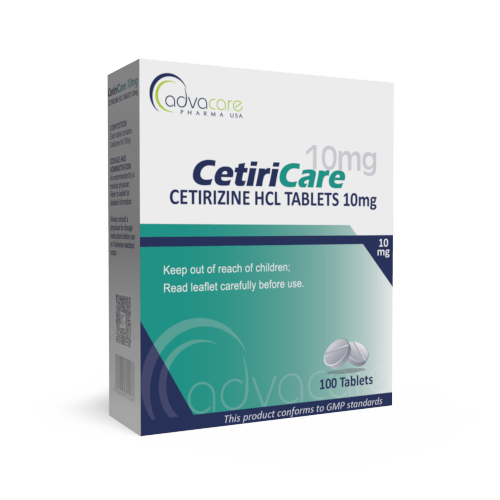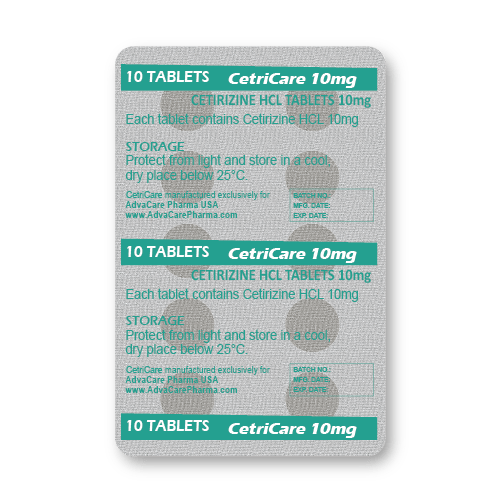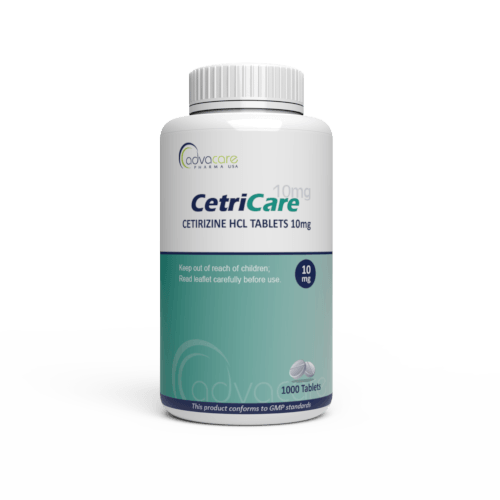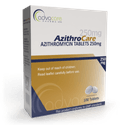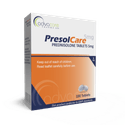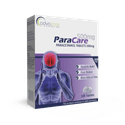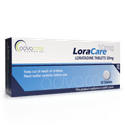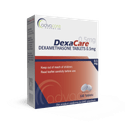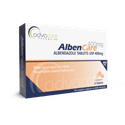- Home›
- Pharmaceuticals›
- Pharmaceutical Tablets›
- Cetirizine Tablets
Cetirizine Tablets
Dosage
Packaging
What is Cetirizine HCl?
Active Ingredients: Cetirizine HCl
Cetirizine HCl Tablets are an antihistamine drug used to relieve symptoms caused by chronic and seasonal allergies, hives, allergic asthma, and eczema. This medication may temporarily relieve the symptoms associated with these conditions, but it does not prevent hives or a serious allergic reaction such as anaphylaxis.
It works by blocking the effects of histamine, the chemical responsible for many allergy-related symptoms. The active ingredient also displays anti-inflammatory abilities.
Cetirizine is a second-generation antihistamine that selectively inhibits peripheral histamine H1 receptors. Histamine is then prevented from activating its receptor which results in decreases in smooth muscle contraction, vascular permeability, basophil histidine uptake, cough receptor stimulation, and nervous system flare responses, which are responsible for many allergy-related symptoms. Cetirizine does not cross the blood brain barrier as much as first-generation antihistamines, making it less likely to cause drowsiness than other antihistamines.
AdvaCare Pharma is a GMP-certified producer and exporter of Cetirizine HCl Tablets and Ambroxol HCl + Cetirizine HCl Syrup. We offer a wide range of high-quality and cost-effective medical products that are available for distribution. These medications are manufactured in our facilities in China, India, and the USA.
Why are we a leading Cetirizine manufacturer?
As a reputable Cetirizine manufacturer, we are dedicated to ensuring that GMP guidelines and standards strictly apply to the manufacture of our entire range of 200+ pharmaceutical treatments in tablet dosage form.
AdvaCare Pharma is an American pharmaceutical company committed to the manufacture of high-quality, affordable pharmaceuticals for a global market. The extensive international network that we partner with includes pharmaceutical distributors, hospitals, pharmacies, and a variety of other medical institutions. Our vision is to manufacture Cetirizine Tablets, and other quality-assured oral solid treatments, that get into the hands of those that need them most.
Uses
What is Cetirizine HCl used for?
It is used to relieve mild to moderate allergy symptoms like sneezing, coughing, nasal congestion, and ocular pruritus. It is commonly used to treat allergic rhinitis, chronic idiopathic urticaria, allergic asthma, and atopic dermatitis.
How should Cetirizine HCl Tablets be used?
This medication is intended to be taken orally. Cetirizine HCl Tablets can be taken with or without food.
What dose should be taken and for how long?
Recommended dosage may vary based on different medical conditions:
- For the treatment of allergic rhinitis and urticaria in adults, the recommended dose is 5-10mg a day with maximum dose of 10mg/day.
- For the treatment of allergic rhinitis and urticaria in children (6 months-5 years), the recommended doses are not available as tablets and the administration of Cetirizine HCl Syrup is recommended for lower doses.
- For the treatment of allergic rhinitis and urticaria in children (≥ 6 years), the recommended dose is 5 or 10mg once a day. The maximum recommended daily dose is 10mg.
The exact dosage is based on medical condition, response to treatment, age, and weight. Refer to a doctor or pharmacist for guidelines on dosage. Do not exceed the advisable dosage.
Who can use Cetirizine?
Cetirizine can be administered to adults and children (≥ 6 months), but caution is advised for specific groups of patients.
Pregnant Animal studies show no evidence of teratogenicity and harmful effects on pregnancy, embryofetal development, childbirth, or postnatal development. Limited data on human pregnancy do not suggest an increased risk for any drug-associated major birth defects, miscarriage, or adverse maternal or fetal outcomes.
The American College of Obstetricians and Gynecologists & the American College of Allergy, Asthma, and Immunology (ACOG-ACAAI) recommends cetirizine for pregnant patients who require antihistamine treatment. Cetirizine should only be used in pregnancy when deemed medically necessary.
Nursing Cetirizine is excreted in human milk at levels approximately 25 to 90% of maternal plasma concentrations. Small, occasional doses are generally acceptable. Larger doses or longer treatment may result in infant drowsiness or decrease milk supply. Cetirizine use while nursing is acceptable if an antihistamine is required.
Pediatric In pediatric patients < 6 years old, the safety and efficacy of cetirizine have not been established. In pediatric patients aged 2 to 11 years, the majority of adverse reactions reported with cetirizine use were mild or moderate.
Children taking cetirizine experience similar side effects as adults, such as somnolence, fatigue, and dry mouth. Children are more likely to experience headaches than adults when taking cetirizine.
Geriatric Cetirizine is safe to use in older patients and is preferred over first-generation antihistamines due to its decreased CNS depressant effects.
Due to the potential for drug sensitivity, dosage reductions in geriatric patients may be considered because of age-related decreases in hepatic and renal function.
Other warnings
In patients with hepatic insufficiency, dosage reductions may not be necessary, as cetirizine is mainly excreted by the kidneys. Cases of transient, reversible hepatic transaminase elevations and hepatitis with elevated bilirubin have been reported with cetirizine use.
In patients with renal insufficiency, dosage reductions are recommended. In patients with severe renal insufficiency, end stage renal disease, or those undergoing hemodialysis, dosage reductions are warranted.
Rare, potentially severe adverse events have been reported with cetirizine use, including severe hypotension, anaphylaxis, hemolytic anemia, acute generalized exanthematous postulosis (AGEP), convulsions, hallucinations, suicidal ideations and suicide, cholestasis, orofacial dyskinesia, glomerulonephritis, hepatitis, stillbirth, thrombocytopenia, and rebound pruritus-pruritus within a few days after treatment discontinuation and typically following long-term use (months to years).
Cetirizine should not be used concurrently with alcohol or other CNS depressants, such as benzodiazepines or opioids, as it may result in dose-dependent sedation. Those performing activities that require concentration and alertness, such as operating vehicles or other heavy machinery, should use caution.
Cetirizine is contraindicated in anyone with a known hypersensitivity to it or any of its ingredients. It is also contraindicated in anyone with a known hypersensitivity to hydroxyzine, as cetirizine is a metabolite of hydroxyzine.
Some patients taking cetirizine have reported events of somnolence, fatigue, and asthenia. Somnolence is dose-dependent and may contribute to daytime sleepiness in some patients. Caution should be exercised when performing actions that require complete mental alertness and motor coordination, such as operating a vehicle or machinery. Cetirizine use in combination with alcohol or other central nervous system depressants (local anesthetics, sleeping pills, muscle relaxers, anticonvulsants) is not advised, as they can increase any reductions in alertness and coordination.
Some patients taking cetirizine have reported urinary retention. Patients with a predisposition to urinary retention from spinal cord lesions, benign prostatic hyperplasia, or concomitant use of other medications that can result in urinary retention should exercise caution and discontinue cetirizine if urinary retention occurs.
Concomitant use of cetirizine with pseudoephedrine is contraindicated for patients with severe coronary artery disease or uncontrolled hypertension.
Cetirizine does not have any known severe drug-drug interactions that are potentially dangerous. Concomitant administration with pitolisant may reduce the efficacy of pitolisant. Cetirizine should not be administered with erdafitinib or verapamil, as they are both inhibitors of P-glycoprotein. Concomitant administration prevents the efflux of cetirizine from the CNS and increases antihistaminic activity.
Cases of cetirizine overdose are rare and typically consist of children unintentionally overdosing on medication that was not properly stored. Most overdoses in children resolve spontaneously, with drowsiness and sedation being the main adverse effects observed. Other cases have presenting with somnolence, restlessness and irritability, and effects consistent with anticholinergic toxicity, such as fixed and dilated pupils, tachycardia, agitation, hyperthermia, and hallucinations. There is no known antidote to cetirizine, and it is not effectively removed by dialysis. The treatment of cetirizine overdoses is typically supportive and symptomatic.
Carcinogenic studies of cetirizine did not find evidence of carcinogenicity or fertility and reproductive impairment when administered to rats. A 2-year study in mice found an increased incidence of benign hepatic tumors in males at doses 15 times greater than the adult maximum recommended human dose (MHRD). Increased tumor incidences were not observed at doses 4 times greater than the adult MHRD. The clinical significance of these findings for the long-term cetirizine use in humans is unknown. In vitro assays did not reveal mutagenicity with cetirizine exposure.
Patients with narrow-angle glaucoma should exercise caution when using cetirizine, as it may dilate the pupil and lead to sight-threatening adverse events. The potential for cetirizine to precipitate narrow-angle glaucoma in those who are at risk should be considered.
Side Effects
As with all pharmaceuticals, some unwanted effects can occur from the use of Cetirizine HCl Tablets.
Common side effects include, but may not be limited to:
- drowsiness
- tiredness
- dry mouth
- stomach pain
- nausea
- headache
Seek medical attention if the following develop:
- confusion
- fast, irregular heartbeat
- tremors or insomnia
- hyperactivity
- changes in vision
For a comprehensive understanding of all potential side effects, consult a medical professional.
If any symptoms persist or worsen, or you notice any other symptoms, please call your doctor immediately.
Precautions
Do NOT use Cetirizine HCl Tablets if:
- You are allergic to cetirizine, hydroxyzine, or any piperazine derivatives.
- You have problems with urinary retention.
- You have a hereditary galactose intolerance.
Before treatment, consult your doctor regarding any medications you are taking to address potential drug interactions.
This medication may not be suitable for people with certain conditions, so it is important to consult with a doctor if you have any health conditions.
Alcohol, sedatives, and tranquilizers should be avoided, as they may worsen drowsiness caused by cetirizine HCl.
References
The Clinical Use of Cetirizine in the Treatment of Allergic Rhinitis
The objective of this review is to summarize the amount of data collected over 25 years of clinical use of cetirizine and compare this with data available for other second-generation H1 antihistamines (SGAHs) in the management of patients with allergic rhinitis (AR). Different databases were used for searching relevant papers.
The results showed that compared to other SGAHs, cetirizine was generally more tolerated and had more positive effects in patients. It was more efficacious in inhibiting nasal and ocular symptoms as well as improving the quality of life in patients with allergic rhinitis.
The conclusion of this study is that cetirizine is the most used antihistaminic drug and has been very efficient in cases of allergic rhinitis.
You might be interested in...
Why AdvaCare Pharma?
As an industry leader, we are aware of our responsibility to provide affordable and sustainable solutions to improve healthcare worldwide.
